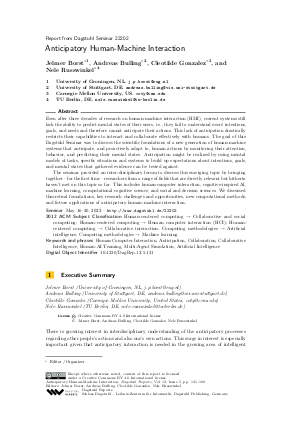Anticipatory Human-Machine Interaction (Dagstuhl Seminar 22202)
Authors Jelmer Borst, Andreas Bulling, Cleotilde Gonzalez, Nele Russwinkel and all authors of the abstracts in this report
-
Part of:
Issue:
Dagstuhl Reports, Volume 12, Issue 5
Part of: Volume: Dagstuhl Reports, Volume 12
Part of: Journal: Dagstuhl Reports (DagRep) - License:
 Creative Commons Attribution 4.0 International license
Creative Commons Attribution 4.0 International license
- Publication Date: 2022-12-08
File

PDF
DagRep.12.5.131.pdf
- Filesize: 4 MB
- 39 pages
Document Identifiers
Subject Classification
ACM Subject Classification
- Human-centered computing → Collaborative and social computing
- Human-centered computing → Human computer interaction (HCI)
- Human-centered computing → Collaborative interaction
- Computing methodologies → Artificial intelligence
- Computing methodologies → Machine learning
Keywords
- Human-Computer Interaction
- Anticipation
- Collaboration
- Collaborative Intelligence
- Human-AI Teaming
- Multi-Agent Simulation
- Artificial Intelligence
Metrics
- Access Statistics
-
Total Accesses (updated on a weekly basis)
0Document
0Metadata
Abstract
Even after three decades of research on human-machine interaction (HMI), current systems still lack the ability to predict mental states of their users, i.e., they fail to understand users' intentions, goals, and needs and therefore cannot anticipate their actions. This lack of anticipation drastically restricts their capabilities to interact and collaborate effectively with humans. The goal of this Dagstuhl Seminar was to discuss the scientific foundations of a new generation of human-machine systems that anticipate, and proactively adapt to, human actions by monitoring their attention, behavior, and predicting their mental states. Anticipation might be realized by using mental models of tasks, specific situations and systems to build up expectations about intentions, goals, and mental states that gathered evidence can be tested against. The seminar provided an inter-disciplinary forum to discuss this emerging topic by bringing together - for the first time - researchers from a range of fields that are directly relevant but hitherto haven't met on this topic so far. This includes human-computer interaction, cognitive-inspired AI, machine learning, computational cognitive science, and social and decision sciences. We discussed theoretical foundations, key research challenges and opportunities, new computational methods, and future applications of anticipatory human-machine interaction.
Cite As Get BibTex
Jelmer Borst, Andreas Bulling, Cleotilde Gonzalez, and Nele Russwinkel. Anticipatory Human-Machine Interaction (Dagstuhl Seminar 22202). In Dagstuhl Reports, Volume 12, Issue 5, pp. 131-169, Schloss Dagstuhl – Leibniz-Zentrum für Informatik (2022)
https://doi.org/10.4230/DagRep.12.5.131
BibTex
@Article{borst_et_al:DagRep.12.5.131,
author = {Borst, Jelmer and Bulling, Andreas and Gonzalez, Cleotilde and Russwinkel, Nele},
title = {{Anticipatory Human-Machine Interaction (Dagstuhl Seminar 22202)}},
pages = {131--169},
journal = {Dagstuhl Reports},
ISSN = {2192-5283},
year = {2022},
volume = {12},
number = {5},
editor = {Borst, Jelmer and Bulling, Andreas and Gonzalez, Cleotilde and Russwinkel, Nele},
publisher = {Schloss Dagstuhl -- Leibniz-Zentrum f{\"u}r Informatik},
address = {Dagstuhl, Germany},
URL = {https://drops.dagstuhl.de/entities/document/10.4230/DagRep.12.5.131},
URN = {urn:nbn:de:0030-drops-174462},
doi = {10.4230/DagRep.12.5.131},
annote = {Keywords: Human-Computer Interaction, Anticipation, Collaboration, Collaborative Intelligence, Human-AI Teaming, Multi-Agent Simulation, Artificial Intelligence}
}
